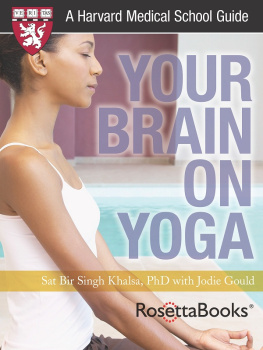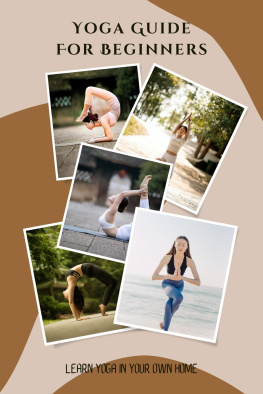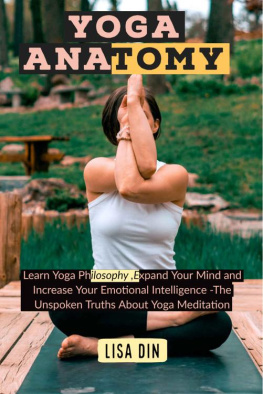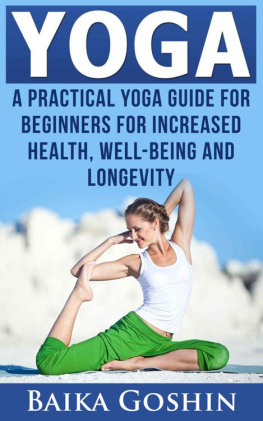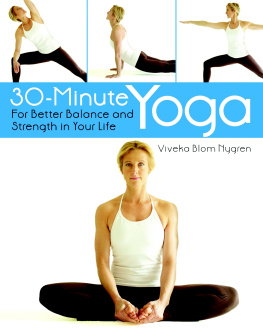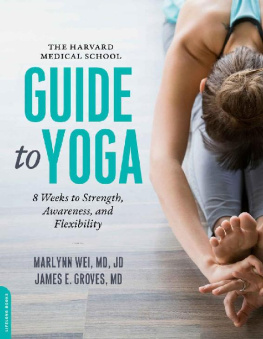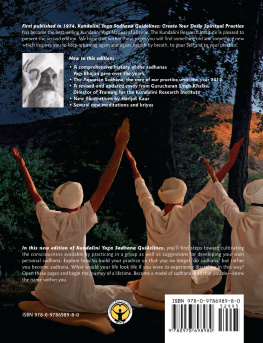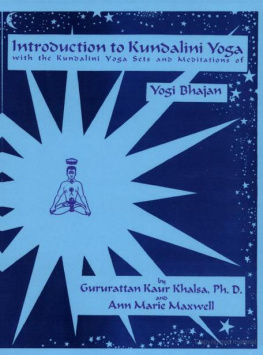Your Brain On Yoga
By Sat Bir Khalsa, PhD
with Jodie Gould
Copyright
Your Brain On Yoga
Copyright 2012 by Harvard University. All rights reserved.
Cover art to the electronic edition copyright 2012 by RosettaBooks LLC.
All Kundalini Meditations courtesy of The Teachings of Yogi Bhajan. Reprinted with permission. All Rights Reserved. To request permission please contact KRI at ww.kriteachings.org.
All rights reserved. No part of this book may be used or reproduced in any form or by any electronic or mechanical means, including information storage and retrieval systems, without permission in writing from the publisher, except by a reviewer who may quote brief passages in a review.
Authors note:
The case examples in this book are drawn from personal interviews. Some names have been changed by request.
This publication is not intended as a substitute for the advice of health care professionals. Any time you practice yoga, it is safest to call your doctor for advice if you experience notable dizziness or faintness, chest pain, or joint or muscle pain.
Electronic edition published 2012 by RosettaBooks LLC, New York.
ISBN ePub edition: 9780795332944
This book is dedicated to Yogi Bhajan, who in selfless service brought the invaluable practices of Kundalini Yoga to the West. I thank my wife Siri Krishna Kaur Khalsa for her kind assistance in compiling suggested yoga practices and the Kundalini Research Institute, the Kripalu Institute for Extraordinary Living, NIH and NCCAM for supporting my research.
Table of Contents
Sat Bir Singh Khalsa, Ph.D., has been fully engaged in basic and clinical research on the effectiveness of yoga and meditation practices in improving physical and psychological health for over 10 years. He has also practiced a yoga lifestyle for over 40 years and is a certified Kundalini Yoga instructor. He is the Director of Research for the Kundalini Research Institute, Research Director of the Kripalu Center for Yoga and Health and an Assistant Professor of Medicine at Harvard Medical School at Brigham and Womens Hospital.
He has been involved in efficacy studies of yoga for a number of conditions including chronic insomnia and anxiety disorders. His current studies include clinical trials of yoga for post-traumatic stress disorder and chronic stress and ongoing research funded by the Kripalu Center for Yoga and Health evaluating a yoga program within the academic curriculum of public schools to determine the benefits in mental health characteristics such as perceived stress, resilience, emotion regulation and anxiety.
Dr. Khalsa routinely interacts internationally with other yoga researchers and he is actively working with the International Association of Yoga Therapists to promote the field of research on yoga therapy. For over 5 years he has also been teaching an elective course at Harvard Medical School in Mind-Body Medicine.
Jodie Gould is an award-winning writer and author of eight books, including Beautiful Brain, Beautiful You. Her articles have appeared in numerous national publications and web sites. She has a masters degree from the Columbia Graduate School of Journalism, where she was awarded a Pulitzer Fellowship and Alfred I. duPont Fellowship.
Can yoga help reduce the stress that makes you look and feel older than your years? Does yoga help elevate your mood and make you mentally sharper? Will meditation enhance your spiritual outlook or give you a sense of peace and calm? As a Harvard neuroscientist and a yoga practitioner for more than 40 years, Im pleased to tell you the answers are a resounding yes. As nearly everyone knows, life can be stressfuland its only getting worse. In the American Psychological Associations Stress in America survey, nearly half of the more than 1,000 respondents reported having more stress in their lives than in the past five years.
Is avoiding all stress possible? Not really. But we can learn ways to reduce or manage our perceived stress and related anxiety through yoga and other contemplative mind-body practices, which have been scientifically proven to change our brain behavior and chemistry and, thereby, reduce our stress. Although there are a few prescription medications that have been used for stress, practicing yoga and meditation are simple and much more desirable ways to cope with stress because they address the root of the problem and do so without any negative side effectsin fact, they often have a few positive side effects.
In this book, you will learn how yoga helps build a resilience to stress so you are able to accept it, deal with it, and get on with your life. After brief sessions only 10 to 15 minutes long, you will start noticing positive physical and mental changes. If you practice regularly, you will experience positive changes in both your body and your attitudes and perceptions, which will support you in moving towards a healthier lifestyle. I will explain why yoga helps us get a deeper, more restorative sleep, which is crucial to keeping our minds and bodies vigorous as we age. When you add proper nutrition and physical exercise to this equation, all this can lead to life-altering behavior and improved mental and physical fitness.
And while yoga helps rejuvenate our bodies and minds, you can also benefit from an elevation of mood, quality of life and even a deeper sense of spirituality. Practicing yoga ultimately allows you to perceive the world in a more relaxed, non-judgmental, positive way, countering the stress reactivity that sends your nervous system into overdrive. Yoga might not literally be a fountain of youth, but it can lead to a transformative experience that will improve your quality of life, your sense of well-being and your outlook on life.
YOUR BRAIN ON YOGA will explain how yoga and meditation can change your brain and, thereby, your life. The way you think about yoga probably depends on your age. In the sixties, yoga was linked to the counterculture and to experimenting musicians like the Beatles. Those who were born in the seventies and beyond will likely picture Madonnas yoga arms and soccer momstheir lithe and Lululemonclad bodies twisting into seemingly impossible positions.
But yoga is far more than the images we see in the media. In fact, at its very essence, it encompasses a range of practices, from sitting quietly to a sweat-producing, heart-pumping physical exercise. But you dont need to begin a yoga practice with the goal of performing gravity-defying positions. The word yoga is translated from the Sanskrit word yug or yuj, which means to yoke or union and traditional yoga practice had the goal of achieving a unitive state of mind in which there is balance between mind and body.
If you are new to yoga, you will find many different types to choose from, (I will describe the most popular practices and advise on selecting the one that is right for you in Chapter 5). But all traditional or classical yoga involves not only physical postures and exercises, but also breath control techniques, deep relaxation techniques, meditation and concentration practices, and the cultivation of mindfulness or awareness. For centuries yogis and saints have understood the mind-body connection, and now todays scientists are realizing its potential within medicine. To some traditional Western physicians, yoga is just another type of workout to be taught at gyms around the country along with spinning and aerobics. But yoga is far more than that.
This book will reveal compelling neuroscientific evidence that demonstrates the variety of ways yoga can change your brain, including brain activity, biochemical and even structural changes. Brain scans (fMRIs), which show pictures of our neural patterns, have demonstrated the positive changes that take place in the brains of people who practice meditation. These neural imaging studies reveal how regions of the brain that are responsible for such fundamental human traits as attention, body awareness, higher-level cognitive function and self-perception grow and become strongerin some cases the transformation occurs immediately.

